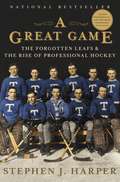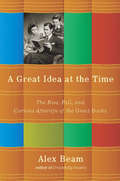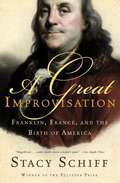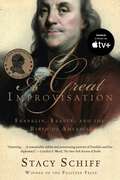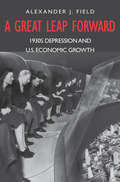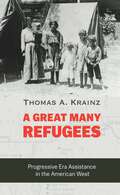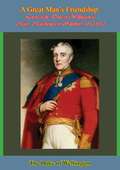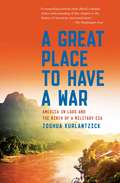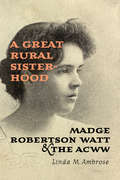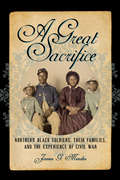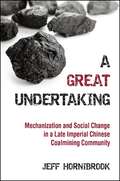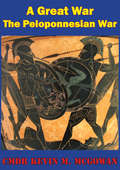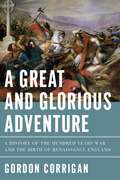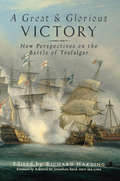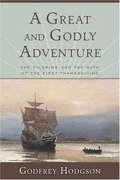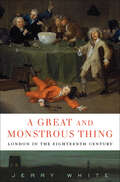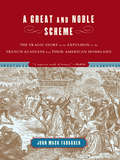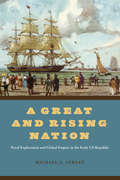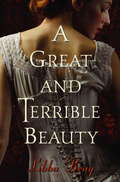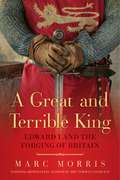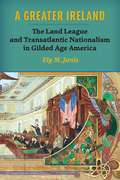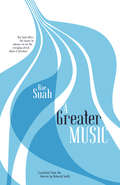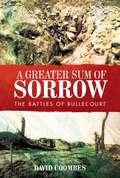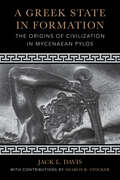- Table View
- List View
A Great Game: The Forgotten Leafs & the Rise of Professional Hockey
by Stephen J. HarperDrawing on extensive archival records and illustrations, histories of the sport, and newspaper files, Canada’s Prime Minister delves into the fascinating early years of ice hockey.In the tumultuous beginnings of hockey, the fights were as much off the ice as on it. This engaging new book is about the hockey heroes and hard-boiled businessmen who built the game, and the rise and fall of legendary teams pursuing the Stanley Cup. With a historian’s perspective and fan’s passion, Stephen Harper presents a riveting and often-surprising portrait, capturing everything from the physical contests on the rinks to the battles behind the scenes.Stephen Harper shows that many things have stayed the same. Rough play, fervent hometown loyalties, owner-player contract disputes, dubious news coverage, and big money were issues from the get-go. Most important in these early years was the question: Was hockey to be a game of obsessed amateurs playing for the love of the sport, or was it a game for paid professionals who would give fans what they wanted? Who should be responsible for the sport—including its bouts of violence—both on and off the ice.A century ago, rinks could melt, and by halftime the blades screwed to the players’ shoes could be sinking in mud. It was during this time that the unsuccessful Toronto Professionals of 1908 and the victorious Toronto Blue Shirts of 1914 battled for the city’s very first Stanley Cup. Against the fanatical opposition of amateur hockey leaders, these “forgotten Leafs” would lay the groundwork for the world’s most profitable hockey franchise.In paying tribute to these hockey pioneers and the contagious loyalty of their fans, Harper resurrects the history of hockey’s first decades. Lavishly illustrated with photographs of the game’s greatest arenas and earliest star players, this entertaining and original book will captivate you from start to finish.
A Great Idea at the Time: The Rise, Fall, and Curious Afterlife of the Great Books
by Alex BeamToday the classics of the western canon, written by the proverbial "dead white men,” are cannon fodder in the culture wars. But in the 1950s and 1960s, they were a pop culture phenomenon. The Great Books of Western Civilization, fifty-four volumes chosen by intellectuals at the University of Chicago, began as an educational movement, and evolved into a successful marketing idea. Why did a million American households buy books by Hippocrates and Nicomachus from door-to-door salesmen? And how and why did the great books fall out of fashion? In A Great Idea at the Time Alex Beam explores the Great Books mania, in an entertaining and strangely poignant portrait of American popular culture on the threshold of the television age. Populated with memorable characters, A Great Idea at the Time will leave readers asking themselves: Have I read Lucretius’s De Rerum Natura lately? If not, why not?
A Great Improvisation: Franklin, France, and the Birth of America
by Stacy SchiffStacy Schiff draws from new and little-known sources to illuminate the least-explored part of Franklin's life. From these pages emerge a particularly human and yet fiercely determined Founding Father, as well as a profound sense of how fragile, improvisational, and international was our country's bid for independence.
A Great Improvisation: Franklin, France, and the Birth of America
by Stacy SchiffSoon to be a streaming series ● In this dazzling work of history, a Pulitzer Prize-winning author follows Benjamin Franklin to France for the crowning achievement of his careerIn December of 1776 a small boat delivered an old man to France." So begins an enthralling narrative account of how Benjamin Franklin--seventy years old, without any diplomatic training, and possessed of the most rudimentary French--convinced France, an absolute monarchy, to underwrite America's experiment in democracy. When Franklin stepped onto French soil, he well understood he was embarking on the greatest gamble of his career. By virtue of fame, charisma, and ingenuity, Franklin outmaneuvered British spies, French informers, and hostile colleagues; engineered the Franco-American alliance of 1778; and helped to negotiate the peace of 1783. The eight-year French mission stands not only as Franklin's most vital service to his country but as the most revealing of the man.In A Great Improvisation, Stacy Schiff draws from new and little-known sources to illuminate the least-explored part of Franklin's life. Here is an unfamiliar, unforgettable chapter of the Revolution, a rousing tale of American infighting, and the treacherous backroom dealings at Versailles that would propel George Washington from near decimation at Valley Forge to victory at Yorktown. From these pages emerge a particularly human and yet fiercely determined Founding Father, as well as a profound sense of how fragile, improvisational, and international was our country's bid for independence.
A Great Leap Forward: 1930s Depression and U.S. Economic Growth
by Alexander J. FieldThis bold re-examination of the history of U.S. economic growth is built around a novel claim, that productive capacity grew dramatically across the Depression years (1929-1941) and that this advance provided the foundation for the economic and military success of the United States during the Second World War as well as for the golden age (1948-1973) that followed. Alexander J. Field takes a fresh look at growth data and concludes that, behind a backdrop of double-digit unemployment, the 1930s actually experienced very high rates of technological and organizational innovation, fueled by the maturing of a privately funded research and development system and the government-funded build-out of the country's surface road infrastructure. This significant new volume in the Yale Series in Economic and Financial History invites new discussion of the causes and consequences of productivity growth over the last century and a half and on our current prospects.
A Great Many Refugees: Progressive Era Assistance in the American West
by Thomas A. KrainzLocal communities in the late nineteenth and early twentieth centuries commonly addressed the needs of refugees, defined broadly during the Progressive Era to include internally displaced people and economic migrants. These communities&’ efforts to assist people in need created a type of informal pop-up welfare system of short-term assistance that provided for hundreds, and often thousands of refugees. In A Great Many Refugees Thomas A. Krainz examines how communities in the American West cared for refugees. The ten case studies include a range of different causes that forced people to flee, including revolution, war, genocide, environmental disaster, and economic recession. Communities tapped into their local resources to provide for refugees, and this informal welfare proved—in the short term—remarkably efficient, effective, and, at times, flexible and innovative. However, local communities simply could not sustain their widespread relief efforts for long and providing meaningful and comprehensive long-term aid proved a near-universal failure. Krainz&’s examination of how Progressive Era residents cared for refugees uncovers a significant segment of welfare policies and practices that have remained largely obscured. These examples of informal, short-term assistance efforts profoundly challenge our standard depiction of local Progressive Era welfare practices as anemic and unresponsive to those in crisis.
A Great Man’s Friendship: Letters of the Duke of Wellington to Mary, Marchioness of Salisbury, 1850-1852
by Lady Burghclere The Duke of WellingtonOriginally published in 1927 and edited by Lady Winifred Anne Henrietta Christiana (Herbert) Burghclere, this book is a collection of the Duke of Wellington's letters to one of his regular correspondents and friend, Mary Catherine Gascoyne-Cecil, Marchioness of Salisbury. The letters in this volume cover the years 1850-1852--the last two years of the Duke of Wellington's life. It ends with the Duke's final note dated September 13, 1952, the eve of his death."The Duke's actions were sometimes mistaken, his judgments sometimes faulty, but the advocatus diaboli can find nothing to challenge in the limpid sincerity of his selfless motives. In these letters, too, the man's kindliness, the "good nature" he proclaimed as so important an ingredient, even in public affairs, is markedly apparent."It is also an illustration of the force of willpower to see an octogenarian able to put through the business which every day brought him. He might grumble that "every animal but the Duke of Wellington is allowed a rest," but the myriad tasks, the countless courtesies and kindnesses, were achieved largely by his lifelong system "to do the business of the day in the day."It is therefore to be hoped that the perusal of these letters will give their readers a more intimate acquaintance with one whose whole career and character must be a source of pride to those of his own race."Illustrated with Portraits.
A Great Place to Have a War: America in Laos and the Birth of a Military CIA
by Joshua KurlantzickThe untold story of how America&’s secret war in Laos in the 1960s transformed the CIA from a loose collection of spies into a military operation and a key player in American foreign policy.January, 1961: Laos, a tiny nation few Americans have heard of, is at risk of falling to communism and triggering a domino effect throughout Southeast Asia. This is what President Eisenhower believed when he approved the CIA&’s Operation Momentum, creating an army of ethnic Hmong to fight communist forces there. Largely hidden from the American public—and most of Congress—Momentum became the largest CIA paramilitary operation in the history of the United States. The brutal war lasted more than a decade, left the ground littered with thousands of unexploded bombs, and changed the nature of the CIA forever. With &“revelatory reporting&” and &“lucid prose&” (The Economist), Kurlantzick provides the definitive account of the Laos war, focusing on the four key people who led the operation: the CIA operative whose idea it was, the Hmong general who led the proxy army in the field, the paramilitary specialist who trained the Hmong forces, and the State Department careerist who took control over the war as it grew. Using recently declassified records and extensive interviews, Kurlantzick shows for the first time how the CIA&’s clandestine adventures in one small, Southeast Asian country became the template for how the United States has conducted war ever since—all the way to today&’s war on terrorism.
A Great Rural Sisterhood
by Linda M. AmbroseAs the founding president of the Associated Country Women of the World (ACWW), Madge Robertson Watt (1868-1948) turned imperialism on its head. During the First World War, Watt imported the "made-in-Canada" concept of Women's Institutes - voluntary associations of rural women - to the British countryside. In the interwar years, she capitalized on the success of the Institutes to help create the ACWW, a global organization of rural women. A feminist imperialist and a liberal internationalist, Watt was central to the establishment of two organizations which remain active around the world today.In A Great Rural Sisterhood, Linda M. Ambrose uses a wealth of archival materials from both sides of the Atlantic to tell the story of Watt's remarkable life, from her early years as a Toronto journalist to her retirement and memorialization after the Second World War.
A Great Sacrifice: Northern Black Soldiers, Their Families, and the Experience of Civil War (The North's Civil War)
by James G. Mendez“Offers readers new insight into the lives of African American men and women from the North in the era of the Civil War.” —Liz Regosin, Charles A. Dana Professor of History, St. Lawrence UniversityA Great Sacrifice is an in-depth analysis of the effects of the Civil War on northern black families carried out using letters from northern black women—mothers, wives, sisters, and female family friends—addressed to a number of Union military officials.Collectively, the letters give a voice to the black family members left on the northern homefront. Through their explanations and requests, readers obtain a greater apprehension of the struggles African American families faced during the war, and their conditions as the war progressed. The original letters that were received by government agencies, as well as many of the copies of the letters sent in response, are held by the National Archives in Washington, D.C.This study is unique because it examines the effects of the war specifically on northern black families. Most other studies on African Americans during the Civil War focused almost exclusively on the soldiers.“In this deeply researched and revealing book, James G. Mendez seeks to recover the experience of northern black soldiers and their families during the Civil War era in order to discover the ways they engaged the governments of their day both to recognize and respect their service and sacrifice during the war and to count the costs northern blacks paid out in impoverished families, wartime casualties, and unfulfilled promises . . . Mendez’s book deserves our attention and appreciation.” —American Historical Review
A Great Undertaking: Mechanization and Social Change in a Late Imperial Chinese Coalmining Community
by Jeff HornibrookJeff Hornibrook provides a unique, microcosmic look at the process of industrialization in one Chinese community at the turn of the twentieth century. Industrialization came late to China, but was ultimately embraced and hastened to aid the state's strategic and military interests. In Pingxiang County in the highlands of Jiangxi Province, coalmining was seasonal work; peasants rented mines from lineage leaders to work after the harvest. These traditions changed in 1896 when the court decided that the county's mines were essential for industrialization. Foreign engineers and Chinese officials arrived to establish the new social and economic order required for mechanized mining, one that would change things for people from all levels of society. The outsiders constructed a Westernized factory town that sat uneasily within the existing community. Mistreatment of the local population, including the forced purchase of gentry-held properties and the integration of peasants into factory-style labor schemes, sparked a series of rebellions that wounded the empire and tore at the fabric of the community. Using stories found in memoirs of elite Chinese and foreign engineers, correspondence between gentry and powerful officials, travelogues of American missionaries and engineers, as well as other sources, Hornibrook offers a fascinating history of the social and political effects of industrialization in Pingxiang County.
A Great War - More Worthy Of Relation Than Any That Had Preceded It: The Peloponnesian War As A Rosetta Stone For Joint Warfare And Operational Art
by Cmdr Kevin M. McGowanThe study of military history is a vital component of Joint Professional Military Education (JPME) as a complement to the study of Joint Doctrine. The Joint Military Operations Historical Collection (JMOHC) illustrates principles of Joint Doctrine and Joint Force Employment through historical and modern example of U.S. Joint Force Operations.Thucydides' history of the Peloponnesian War is recognized dogmatically as a definitive text with regard to the study of National Strategy and Policy, international relations, and political science. In addition to being the first true military historian, many regard Thucydides as the father of the study of International Relations, and the first writer in the intellectual tradition of Realism. This paper proposes that Thucydides history of the 27 year long Peloponnesian War is not only important to Strategic level of military studies, but is equally applicable to the military studies at the Operational level of war. Thucydides history is the first account of complex Joint Military Operations (JMO) in a major conflict between the joint forces (land and sea) of multi-national coalitions fighting in multiple theaters (sometimes simultaneously) across multiple domains. This paper will demonstrate that the fundamentals of Joint Force Employment were clearly validated in the Peloponnesian War as the outcome at key decisive points (Major Operations) was ultimately determined by superior (or inferior) operational execution when examined within the frameworks of the Principles of War and Center of Gravity at the Operational level.Finally, this paper will draw conclusions as to which principles of Joint Force Employment were the most determinant in the Peloponnesian War and draw lessons learned based upon these conclusions as to the enduring importance of the Principles of War and Operational Art for Joint Force Planning and Joint Force Employment in the modern era.
A Great and Glorious Adventure: A History of the Hundred Years War and the Birth of Renaissance England
by Gordon CorriganThe glory and tragedy of the Hundred Years War is revealed in a new historical narrative, bringing Henry V, the Black Prince, and Joan of Arc to fresh and vivid life In this captivating new history of a conflict that raged for over a century, Gordon Corrigan reveals the horrors of battle and the machinations of power that have shaped a millennium of Anglo-French relations. The Hundred Years War was fought between 1337 and 1453 over English claims to both the throne of France by right of inheritance and large parts of the country that had been at one time Norman or, later, English. The fighting ebbed and flowed, but despite their superior tactics and great victories at Crécy, Poitiers, and Agincourt, the English could never hope to secure their claims in perpetuity: France was wealthier and far more populous, and while the English won the battles, they could not hope to hold forever the lands they conquered. Military historian Gordon Corrigan's gripping narrative of these epochal events in combative and refreshingly alive, and the great battles and personalities of the period - Edward III, The Black Prince, Henry V, and Joan of Arc among them - receive the full attention and reassessment they deserve.
A Great and Glorious Victory: New Perspectives on the Battle of Trafalgar
by Richard HardingIn October 2005 an international naval conference was held at Portsmouth and well-known historians and naval officers from around the world, including Colin White, Brian Lavery, Contre Amiral Remi Monaque and Admiral Sir Jonathan Band, now First Sea Lord, gave a series of papers on aspects of the battle of Trafalgar. Containing a wealth of new information they are now form the core of this book. Twelve chapters cover every aspect of the battle but also explore important associated themes such as the Grand Armee and the invasion threat, and the British defenses against invasion in the years before 1805. On the battle itself there are pieces on the ships, men and the tactics, and important chapters from the French and Spanish perspectives. Perhaps the most groundbreaking contribution is from the Inshore Squadron, a naval war-gaming group, which produced a timeline that is the most accurate yet available and reveals, amongst other things, the nature of the ship-on-ship actions and the timing of some of the set events. Put into its strategic, political and economic context, the battle is brought to life in a way which distinguishes it from all the other accounts that have appeared and offers enthusiasts and historians the most up-to-date and important reassessment that is available.
A Great and Godly Adventure: The Pilgrims and the Myth of the First Thanksgiving
by Godfrey Hodgson(back of book) An original and eye-opening history of our national origins, A Great and Godly Adventure is peppered with delightful and unexpected insights. Godfrey Hodgson sheds new light on the radicalism of the so-called Pilgrims, the financing of their trip, the state of the Indian tribes that they encountered, and the reasons they probably didn't land on the rock. The Thanksgiving traditions that Hodgson suggests are in fact not traditional at all include the idea that the first Thanksgiving was celebrated with turkey (the Pilgrims' muskets were unlikely to fire fast enough to kill one of the birds), or cranberry sauce (there was no sugar). Indeed, the settlers-who probably didn't think of themselves as Pilgrims and were certainly not revolutionaries against their king- had little to be thankful for: they were lucky not to be wiped out during their first winter.
A Great and Monstrous Thing: London in the Eighteenth Century
by Jerry WhiteThis &“magisterial history of London&” explores the rapidly changing culture and commerce of the eighteenth century in &“a book that hums with vitality&” (Times Literary Supplement, UK). London in the eighteenth century was a new city, risen from the ashes of the Great Fire of 1666. The century that followed was an era of vigorous expansion and rapid change as waves of people were drawn to its wealth, power, and many diversions. Borrowing a phrase from Daniel Defoe, Jerry White calls London &“this great and monstrous thing,&” the grandeur of its new buildings and the glitter of its high life shadowed by poverty and squalor.A Great and Monstrous Thing offers a street-level view of eighteenth century London&’s public gardens and prisons, its banks, and brothels, its workshops and warehouses. White introduces us to shopkeepers and prostitutes, men and women of fashion and genius, street-robbers and thief-takers, as they play out the astonishing drama of city life. What emerges is a picture of a society fractured by geography, politics, religion, history—and especially by class. Despite the deep and destructive gulf between rich and poor, Jerry White shows us Londoners going about their business as bankers or beggars, reveling in an enlarging world of public pleasures, indulging in crimes both great and small—amidst the tightening sinews of power and regulation, and the hesitant beginnings of London democracy.
A Great and Noble Scheme: The Tragic Story of the Expulsion of the French Acadians from Their American Homeland
by John Mack Faragher"Altogether superb; a worthy memorial to the victims of two and a half centuries past."--Kirkus Reviews, starred review In 1755, New England troops embarked on a "great and noble scheme" to expel 18,000 French-speaking Acadians ("the neutral French") from Nova Scotia, killing thousands, separating innumerable families, and driving many into forests where they waged a desperate guerrilla resistance. The right of neutrality; to live in peace from the imperial wars waged between France and England; had been one of the founding values of Acadia; its settlers traded and intermarried freely with native Mikmaq Indians and English Protestants alike. But the Acadians' refusal to swear unconditional allegiance to the British Crown in the mid-eighteenth century gave New Englanders, who had long coveted Nova Scotia's fertile farmland, pretense enough to launch a campaign of ethnic cleansing on a massive scale. John Mack Faragher draws on original research to weave 150 years of history into a gripping narrative of both the civilization of Acadia and the British plot to destroy it.
A Great and Rising Nation: Naval Exploration and Global Empire in the Early US Republic (American Beginnings, 1500-1900 Ser.)
by Michael A. VerneyA Great and Rising Nation illuminates the unexplored early decades of the United States’ imperialist naval aspirations. Conventional wisdom holds that, until the Spanish-American War of 1898, the United States was a feeble player on the world stage, with an international presence rooted in commerce rather than military might. Michael A. Verney’s A Great and Rising Nation flips this notion on its head, arguing that early US naval expeditions, often characterized as merely scientific, were in fact deeply imperialist. Circling the globe from the Mediterranean to South America and the Arctic, these voyages reflected the diverse imperial aspirations of the new republic, including commercial dominance in the Pacific World, religious empire in the Holy Land, proslavery expansion in South America, and diplomatic prestige in Europe. As Verney makes clear, the United States had global imperial aspirations far earlier than is commonly thought.
A Great and Terrible Beauty
by Libba BrayIt's 1895, and after the death of her mother, 16-year-old Gemma Doyle is shipped off from the life she knows in India to Spence, a proper boarding school in England. Lonely, guilt-ridden, and prone to visions of the future that have an uncomfortable habit of coming true, Gemma's reception there is a chilly one. To make things worse, she's being followed by a mysterious young Indian man, a man sent to watch her. But why? What is her destiny? And what will her entanglement with Spence's most powerful girls - and their foray into the spiritual world - lead to?
A Great and Terrible King: Edward I And The Forging Of Britain
by Marc MorrisThe first major biography of a truly formidable king, whose reign was one of the most dramatic and important of the entire Middle Ages, leading to war and conquest on an unprecedented scale. Edward I is familiar to millions as "Longshanks," conqueror of Scotland and nemesis of Sir William Wallace (in "Braveheart"). Yet this story forms only the final chapter of the king's action-packed life. Earlier, Edward had defeated and killed the famous Simon de Montfort in battle; travelled to the Holy Land; conquered Wales, extinguishing forever its native rulers and constructing a magnificent chain of castles. He raised the greatest armies of the Middle Ages and summoned the largest parliaments; notoriously, he expelled all the Jews from his kingdom.The longest-lived of England's medieval kings, he fathered fifteen children with his first wife, Eleanor of Castile, and, after her death, he erected the Eleanor Crosses--the grandest funeral monuments ever fashioned for an English monarch. In this book, Marc Morris examines afresh the forces that drove Edward throughout his relentless career: his character, his Christian faith, and his sense of England's destiny--a sense shaped in particular by the tales of the legendary King Arthur. He also explores the competing reasons that led Edward's opponents (including Robert Bruce) to resist him. The result is a sweeping story, immaculately researched yet compellingly told, and a vivid picture of medieval Britain at the moment when its future was decided.
A Great and Wretched City
by Mark JurdjevicLike many inhabitants of booming metropolises, Machiavelli alternated between love and hate for his native city. He often wrote scathing remarks about Florentine political myopia, corruption, and servitude, but also wrote about Florence with pride, patriotism, and confident hope of better times. Despite the alternating tones of sarcasm and despair he used to describe Florentine affairs, Machiavelli provided a stubbornly persistent sense that his city had all the materials and potential necessary for a wholesale, triumphant, and epochal political renewal. As he memorably put it, Florence was "truly a great and wretched city. " Mark Jurdjevic focuses on the Florentine dimension of Machiavelli's political thought, revealing new aspects of his republican convictions. Through "The Prince," "Discourses," correspondence, and, most substantially, "Florentine Histories," Jurdjevic examines Machiavelli's political career and relationships to the republic and the Medici. He shows that significant and as yet unrecognized aspects of Machiavelli's political thought were distinctly Florentine in inspiration, content, and purpose. From a new perspective and armed with new arguments, " A Great and Wretched City" reengages the venerable debate about Machiavelli's relationship to Renaissance republicanism. Dispelling the myth that Florentine politics offered Machiavelli only negative lessons, Jurdjevic argues that his contempt for the city's shortcomings was a direct function of his considerable estimation of its unrealized political potential.
A Greater Ireland
by Ely M. JanisDuring the early 1880s a continual interaction of events, ideas, and people in Ireland and the United States created a "Greater Ireland" spanning the Atlantic that profoundly impacted both Irish and American society. In A Greater Ireland: The Land League and Transatlantic Nationalism in Gilded Age America, Ely M. Janis closely examines the Irish National Land League, a transatlantic organization with strong support in Ireland and the United States. Founded in Ireland in 1879 against the backdrop of crop failure and agrarian unrest, the Land League pressured the British government to reform the Irish landholding system and allow Irish political self-rule. The League quickly spread to the United States, with hundreds of thousands of Irish Americans participating in branches in their local communities. As this "Greater Ireland" flourished, new opportunities arose for women and working-class men to contribute within Irish-American society. Exploring the complex interplay of ethnicity, class, and gender, Janis demonstrates the broad range of ideological, social, and political opinion held by Irish Americans in the 1880s. Participation in the Land League deeply influenced a generation that replaced their old county and class allegiances with a common cause, shaping the future of Irish-American nationalism.
A Greater Music
by Deborah Smith Suah BaeNear the beginning of A Greater Music, the narrator, a young Korean writer, falls into an icy river in the Berlin suburbs, where she's been housesitting for her on-off boyfriend Joachim. This sets into motion a series of memories about life in Berlin, about literature, language, music, and the tragic love affair she with her female German teacher named M.
A Greater Sum of Sorrow: The Battles of Bullecourt
by David CoombesIn April-May 1917 the sleepy hamlet of Bullecourt in northern France became the focus of two battles involving Australian and British troops. Given the unique place in this nation’s military history that both battles occupy, surprisingly little has been written on the AIF’s achievements at Bullecourt. A Greater Sum of Sorrow seeks to remedy this gaping omission. The First Battle of Bullecourt marked the Australians’ introduction to the latest battlefield weapon — the tank. This much-lauded weapon failed dismally amid enormous casualties. Despite this, two infantry brigades from the 4th Australian Division captured parts of the formidable Hindenburg Line with minimal artillery and tank support, repulsing German counter-attacks until forced to withdraw. In the second battle, launched with a preliminary artillery barrage, more Australian divisions were forced into the Bullecourt ‘meat-grinder’ and casualties soared to over 7000. Again Australian soldiers fought hard to capture parts of the enemy line and hold them against savage counter-attacks. Bullecourt became a charnel-house for the AIF. Many who had endured the nightmare of Pozières considered Bullecourt far worse. And for what? While Field Marshal Sir Douglas Haig considered its capture ‘among the great achievements of the war’, the village that cost so many lives held no strategic value whatsoever.
A Greek State in Formation: The Origins of Civilization in Mycenaean Pylos (Sather Classical Lectures #75)
by Jack L. DavisA free open access ebook is available upon publication. Learn more at www.luminosoa.org. Although the Mycenaean civilization of the Greek Bronze Age was identified 150 years ago, its origins remain obscure. Jack L. Davis, codirector of excavations at the Palace of Nestor at Pylos, takes readers on a tour of the beginnings of Mycenaean civilization through a case study of this important site. In collaboration with codirector Sharon R. Stocker, Davis demonstrates that this ancient place was a major node for the exchange of ideas between the already established Minoan civilization, centered on the island of Crete, and the residents of the Greek mainland. Davis and Stocker show how adoption of Minoan culture created an ideology of power focused on a single individual, celebrating his military prowess, investing him with divine authority, and creating a figure instantly recognizable to readers of Homer and students of Greek history. A Greek State in Formation makes the powerful case that a knowledge of the Greek Bronze Age is indispensable to the classics curriculum.
